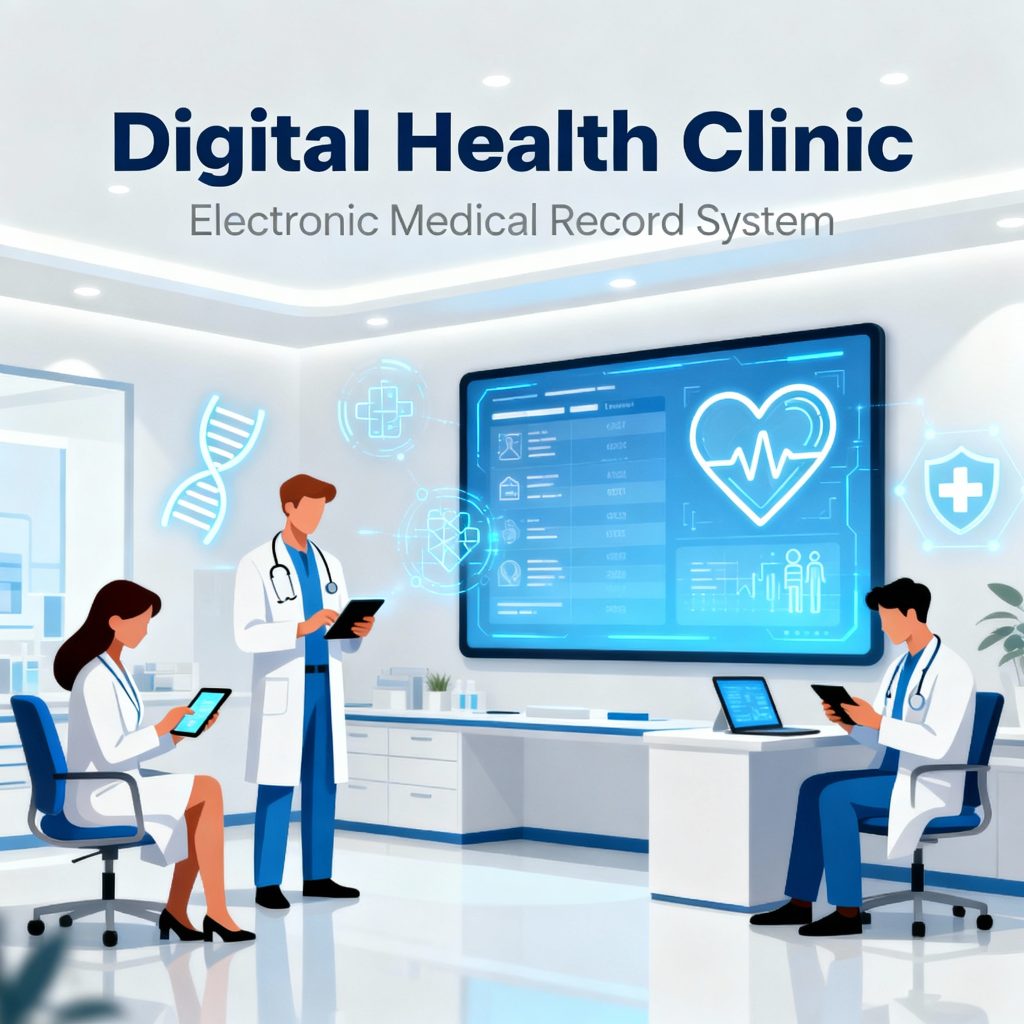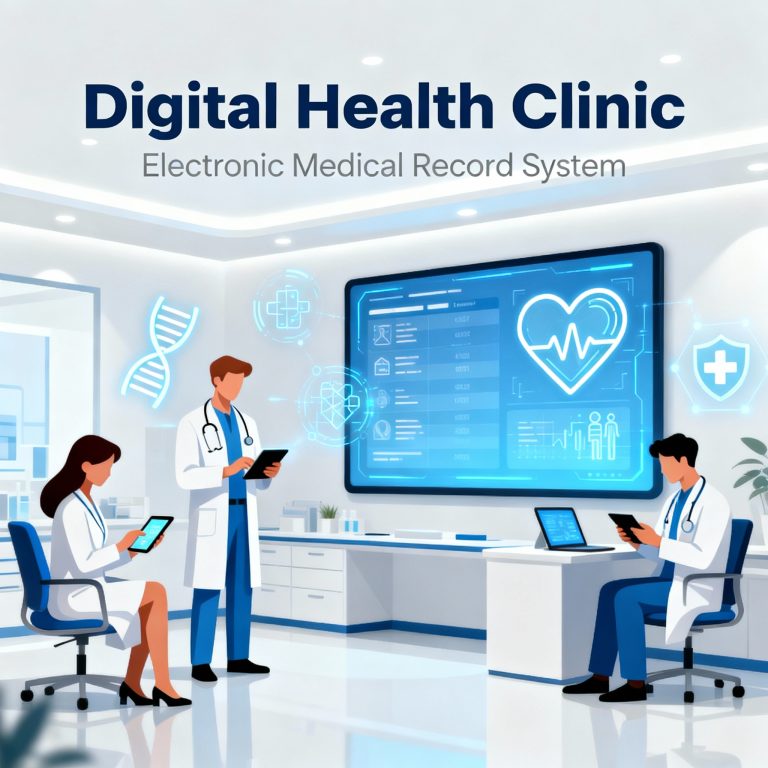In today’s rapidly evolving healthcare landscape, electronic medical record systems (EMR systems) have become a cornerstone for efficient, accurate, and patient-centered care. As hospitals and clinics continue to embrace digitization, the shift from paper-based records to electronic medical record service platforms is not merely a trend—it is a necessity. Consequently, healthcare providers worldwide are exploring online EMR/EHR healthcare solutions to streamline operations, enhance patient safety, and improve clinical outcomes.
Understanding Electronic Medical Record Systems
To begin with, an electronic medical record system is a digital version of a patient’s paper chart. More than just a digital repository, it allows healthcare professionals to store, manage, and access patient information in real time. Moreover, these systems integrate various functionalities, such as appointment scheduling, lab results management, and prescription tracking, thereby eliminating the inefficiencies of traditional record-keeping.
Notably, the adoption of EMR systems is not limited to large hospitals. Small clinics and specialty practices are also leveraging these solutions to improve workflow, reduce human errors, and maintain a higher standard of patient care. Consequently, electronic medical record service platforms have become essential tools in the modern healthcare ecosystem.
Advantages of Online EMR/EHR Healthcare Solutions
Transitioning to online EMR/EHR healthcare solutions offers numerous advantages. Firstly, accessibility is greatly enhanced. Healthcare professionals can access patient records securely from any location, thus facilitating telemedicine and remote consultations. Secondly, these systems significantly reduce paperwork, which not only saves time but also minimizes the risk of lost or misplaced records.
Furthermore, EMR systems improve data accuracy and consistency. By maintaining structured digital records, healthcare providers can ensure that every patient receives accurate diagnoses and treatment plans. Additionally, integrated analytics tools allow for real-time monitoring of patient health trends, which in turn supports proactive healthcare interventions.
Equally important, compliance with regulatory standards such as HIPAA is more achievable with electronic records. The built-in security measures, including encrypted data storage and controlled access, help healthcare institutions safeguard sensitive patient information. Therefore, investing in an electronic medical record service is not just a matter of convenience but also a critical aspect of legal and ethical compliance.
Key Features of Electronic Medical Record Systems
In order to fully understand their impact, it is necessary to explore the key features of electronic medical record systems. These systems typically include:
- Patient Demographics Management: Storing essential information such as age, gender, and medical history.
- Clinical Notes and Documentation: Enabling physicians to record detailed patient encounters digitally.
- Laboratory and Test Results Integration: Allowing instant access to lab reports and imaging results.
- Medication and Prescription Management: Ensuring safe prescribing practices and reducing errors.
- Billing and Insurance Integration: Streamlining administrative processes and reducing delays in claims processing.
Moreover, many online EMR/EHR healthcare solutions offer mobile applications that further enhance the accessibility and convenience of patient care. By combining these features, EMR systems not only improve operational efficiency but also enhance patient satisfaction.

Why Healthcare Providers Are Switching to Electronic Medical Record Services
There are several reasons why healthcare providers are rapidly adopting electronic medical record service platforms. Firstly, patient expectations have evolved. Patients now demand faster, more efficient, and transparent healthcare services. Consequently, providers are investing in EMR systems to meet these expectations.
Secondly, the healthcare industry is increasingly data-driven. By leveraging electronic medical record systems, providers can collect and analyze vast amounts of patient data, which supports research, preventive care, and personalized treatment plans. Additionally, digital records make it easier to share information with other healthcare professionals, thereby promoting collaborative care.
In addition, cost savings cannot be ignored. Although initial implementation may require investment, online EMR/EHR healthcare solutions reduce administrative overhead, minimize errors, and enhance resource allocation. Therefore, the long-term financial benefits make EMR adoption a wise strategic choice.
Challenges and Solutions in EMR Implementation
Despite the numerous benefits, implementing electronic medical record systems is not without challenges. One common issue is resistance from staff who are accustomed to traditional paper records. However, comprehensive training and user-friendly interfaces can significantly mitigate this problem.
Another challenge is ensuring data security. While EMR systems are generally secure, breaches can occur if proper protocols are not followed. Thus, healthcare institutions must implement robust cybersecurity measures, including regular audits, encryption, and access control.
Moreover, integration with existing systems can sometimes be complex. Nonetheless, most electronic medical record service providers offer customizable solutions that seamlessly integrate with existing healthcare IT infrastructure. As a result, the benefits of EMR systems far outweigh the challenges when proper planning and support are in place.
The Future of Healthcare with Online EMR/EHR Solutions
Looking forward, online EMR/EHR healthcare solutions will continue to transform healthcare delivery. Artificial intelligence and machine learning are increasingly being integrated into EMR platforms, enabling predictive analytics, early diagnosis, and personalized treatment plans. Consequently, healthcare providers will be able to offer more proactive and precise care.
Telemedicine will also benefit immensely. With EMR systems, physicians can access patient histories instantly during virtual consultations, making remote care more effective. Additionally, interoperability between EMR systems will enable seamless patient data exchange across hospitals, clinics, and laboratories, ensuring continuity of care.
Finally, the adoption of EMR systems supports population health management. By analyzing aggregated patient data, healthcare organizations can identify trends, monitor outbreaks, and implement preventive measures on a larger scale. Therefore, electronic medical record systems are not just transforming individual patient care—they are shaping the future of public health as well.
Conclusion
In conclusion, electronic medical record systems have revolutionized the way healthcare is delivered. From enhancing patient safety to improving operational efficiency, these systems provide a comprehensive platform for modern healthcare providers. Moreover, by leveraging online EMR/EHR healthcare solutions, healthcare institutions can ensure accessibility, accuracy, and compliance, ultimately leading to better patient outcomes.The transition to a reliable electronic medical record service is no longer optional—it is essential for any healthcare organization aiming to provide high-quality, patient-centered

